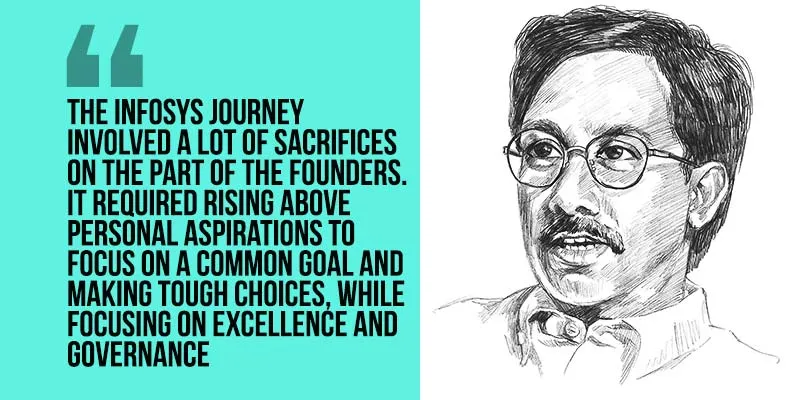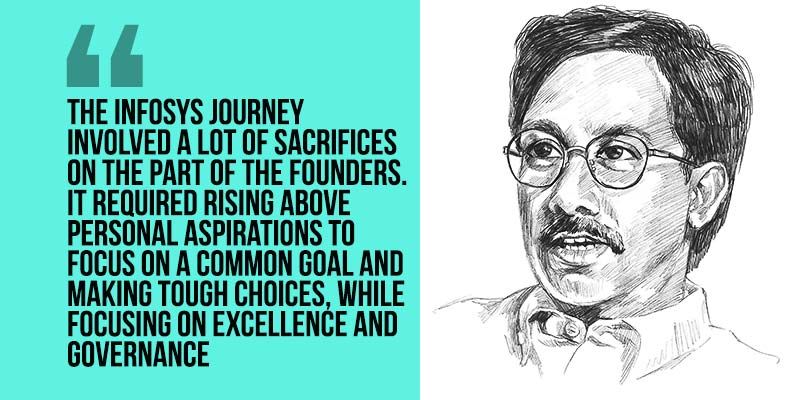What Indian startups can learn from Infosys and its dream run, Shibulal shares
In 1981, when Sarojini Damodaran Shibulal (Shibu) left Patni Computers to join Narayana Murthy and five others to start Infosys Consultants Pvt Ltd, he was not only charting the path to IT revolution in India but also actively participating in the technology revolution that followed. Former member of the board and CEO of Infosys, Shibu is known for his passion for technology. He recently co-founded Axilor Ventures to help early-stage entrepreneurs improve their odds of success. YourStory got in touch with Shibu to understand the evolution of startups in India and what one can learn from his journey at Infosys. Here are edited excerpts of the same:

Starting up in 90s viz-a-viz starting up now
As compared to previous decades, Shibu believes that the environment is far more conducive now. He recalled the 1990s in India as follows:
- In the eco- system of the 90s, entrepreneurship was not easily accepted. Startups were not encouraged. Also, there were no support systems- no accelerators, no incubators and no angel investors
- Back then, there was no risk capital available. Private funding was virtually non-existent
- The operating environment for businesses was very unfriendly. The ‘license Raj’and the numerous regulations governing businesses had a dampening effect on entrepreneurship
He says,
Today, we have organisations like NASSCOM, TiE, Startup Village, Axilor, which foster entrepreneurship.Venture funding is easily available. The business environment is far less constraining. All this also means that the entry barriers are low and competition is more intense.
He’s happy to see that youth today are much more motivated than they were about a decade ago. They have brilliant ideas and are not scared to take the risk. Shibu observes that the society has become encouraging as the environment is less constraining. Overall, there is more willingness to try, even if they fail in the effort.
Related read: “Is there one invention from India that has become a household name in the globe?”, Narayana Murthy asks
What can Indian startups learn from Infosys and its dream run?
- The value of an idea is in its execution: Infosys was founded on a compelling idea of delivering complex programmes out of India. But we were able to create value only when we were able to follow our idea up with flawless execution.
- The power of a founding team with complementary skills: The Infosys team had a visionary leader in Narayan Murthy. Nandan Nilekanihad the ability to break down complex problems, while K.Dinesh had focus on quality and Kris on innovation.
- Building a successful business is a marathon: The Infosys journey involved a lot of sacrifices on the part of the founders. It required rising above personal aspirations to focus on a common goal. It required making tough choices, while focusing on excellence and governance.
Indian Startups: what’s not right?
Shibu believes that although the economic climate in Indiahas become better, it has a long way to go in some respects. He points out two major pain points in the Indian startup ecosystem:
- The speed of execution of projects gets hampered due to bureaucratic red tape. India’s global ranking on ease of doing business is very low.
- Indian ecosystem is still nascent and uni-dimensional. Growth has taken place mainly in the e-commerce sector; whereas, to harness the true power of innovation and make the ecosystem more resilient, we need to see more startups in other fields such as healthcare, life-sciences, sustainability and clean technology space, as well.
What (more) can government do?
Shibu feels that thecurrent government has taken a number of positive measures to encourage startups, but there’s scope to do more to improve the ease of doing business. He suggests:
- Until the time businesses scale and raise a certain level of funding, they can have ‘lighter’ regulatory norms.
- Early stage funding norms can be simplified to make it on par with what we see in other countries like the US.
According to Shibu, government can play an important role in creating the right foundations like improving the quality of higher education in science and technology.
Also read: Prime Minister launches National Career Service portal, here’s everything you want to know about it
Brain Gain
As the Indian startup ecosystem is nascent, flow of talent from other evolved ecosystems will help a lot. This can happen in multiple ways –experienced folks returning to work with startups as mentors, entrepreneurs coming in to work on large market opportunities here or students coming in to work on interesting ideas. Shibu suggests that in order to facilitate further talent immigration, we should simplify processes to make travel between countries easier and reduce the number of regulations. He also believes that the recent brain gain from Silicon Valley is not to the extent that we require.
Axilor Venture fund
Axilor Ventures aims at improving the odds of success of entrepreneurs in their first 24 months. Axilor’s first batch of accelerator programme has already graduated and applications are open for the winter batch, which is due to begin in September 2015.
In addition to evaluation of ideas, Shibu is working closely with two startups in Axilor’sportfolio as a sponsor and mentor.
He says,
Any emerging ecosystem needs role models and mentors: people who have walked the path before and who can help and guide others who want to follow it.








